#operational problem relevant
Explore tagged Tumblr posts
Text
Stranger Things Reddit is wild, because why on Earth did I just see someone say—without an iota of irony—that Mike and El were “blissfully happy” through all of S3, and had no problems whatsoever in S4 aside from their Nina-related separation?
Their whole S3 squabble wasn’t a problem? El constructing a monthslong fake narrative about her life in California wasn’t a problem? The raised-voices fight they got into wasn’t a problem?
People can disagree on how significant a moment is in the broader context. They can disagree on what an event means for a story. They can disagree on what might happen next. But for a group so invested in a TV show (purportedly, anyway), those people are remarkably uninvested in…what actually happens on the TV show.
#I look at this kind of thing and I think ‘Surely you recognize what an argument is? Surely you understand that arguments aren’t positive?’#They may not believe that an argument (or other problem) spells doom for the relationship as a whole#And that’s fine!#But if you’re spending enough time on a TV show subreddit to get into back-and-forths about how happy a couple is or is not…#then I’d hope you’re familiar enough with the material in question to be aware of significant portion of the main characters’#multi-season(!) arcs.#This isn’t curtains; this is a pipe. They raised voices at each other. Sometimes the problem is indeed a problem!!#I’m done ranting now but…ouch. Watching the mental gymnastics makes me dizzy.#At least a bit of feeling superior every once in a while makes for good enrichment 🙃#byler#<- Target audience—and also this guy seemed to be operating from a ‘Mike and Will would NEVER get together because Mike has never struggled#in his relationship with El so why would you even dare consider something else’ perspective so I feel that makes the tag relevant!#stranger things#st3#st4#mike wheeler#anti mileven#st analysis#mine
14 notes
·
View notes
Text
It's called archeological context!! (Or provenience, if you're fancy.) It's quite possibly the most important part of any archeological find!
If any sort of artifact is found, it's super important where and how it was found. This allows us to infer a ton of stuff, like how the object was used, what culture it was used in, what value it held, and possibly what happened to it since its creation (this is sometimes referred to as provenance).
We actually know a lot about ancient cultural interactions based on artifacts and currency found outside their usual context, implying they've been traded!
Assuming your house gets found in an archeological dig in a couple centuries, archeologists could likely place the time period with some accuracy, likely based on the architecture of the building. (Seriously, the way we've built houses has changed so much over a relatively short amount of time. Indoor plumbing in a presumably middle-ish class home would already rule out anything but the last three generations, and the sewer system is more likely to survive than the house itself. If your house has a garage, it's likely less than 50 years old.) They'd know that Buddhism wasn't particularly widespread in your region, and that Buddhist artifacts there were mostly used for ornamental purposes. They could probably infer whether your lifestyle was in line with Buddhist practices at the time. (If parts of your fridge, waste, or your physical body remain, they could draw conclusions about your diet, for example.)
Depending on what else survives, they might even figure out you were Christian! It's not unlikely someone in your home owns a metal cross, and it's rather uncommon for different faiths to share a home. Other religious texts or artifacts you might not even consider as such (because they're everyday objects to you) could also clue in future archeologists. Your local church and/or graveyard might also be excavated and link back to you and your home.
Also keep in mind this is all based on methods we use right now to study our past. In a couple of centuries, things may look very different. This scenario also assumes that all current records will be lost to time, which isn't impossible, but we are more focused on preservation of records than ever before. Assuming public records get archived indefinitely, it's possible future archeologists could simply. Look up who you were.
Anyway PSA if you ever find something you think might be archeologically valuable DO NOT MOVE IT. DO NOT TAKE IT SOMEWHERE TO GET IT EXAMINED!! Not only could you damage it, you'd also be removing the object from its context, which makes it near impossible to learn anything about it. Your best bet is likely to contact the nearest University with an archeological department.
If someone finds the Buddha statue some centuries later and takes it to whatever their version of a research institution is, the researcher there could at best shrug and say "well the owner mightve been buddhist but theres no way to know"
This long wall of text was brought to you by Milo Rossi/Miniminuteman on YouTube.
When I think about interpreting archaeology stuff I think about two religious symbols I have in my room.
I have a cross on my wall made of olive wood and I have a little ceramic Buddha statue on my desk.
Now of these two objects the ceramic Buddha statue is far more likely to survive the ravages of time. However I am not Buddhist. I do not pray to Buddha. I just think the statue is neat. I am in fact a Christian. The wooden cross is the more relevant thing there when it comes to understanding my personal beliefs.
So if my belongings were found like a thousand years from now someone might think oh this person might’ve been Buddhist. Because the ceramic figurine survived while the olive wood cross did not.
Also is my Buddha statue a ritual object? Technically yes but not in my room. In my room it’s a neat little knickknack.
I’m sure archeologists know all about this sort of thing which is why figuring out what certain things are actually used for is weird. What was that? What did it mean to its owner? We can only guess.
#ramble#in case me linking a youtube channel as primary source did not make it obvious: im not an archeologist. i dont know shit.#although funnily enough i might have a decent bit of cultural knowledge that would be relevant#unfortunately i do not intend to live a couple more centuries just so i can recant my american studies knowledge for future generations#but seriously we stand decent odds to have more documentation than any era before us. its never been easier to document.#the bigger issue will be if anyone can still boot up a windows 10 operating system in a couple of centuries#we will no doubt face entirely new problems of conservation. which we already are. you quite literally cannot legally watch infinity train.#there are episodes of sailor moon that wouldve been lost without piracy iirc.#right now people are archiving .gov sites because history is being scrubbed from them in ways that werent possible before.#theres a reason it got likened to book burnings by some historians. in which i am including myself.#guess im a historian. a tiny bit. more about the last century than anything else. but thats part of my degree too.#once i fucking get it that is. the mental health facility better make me able to write my fucking thesis i swear to god#reminds me i should be writing emails and not rants. but its fascinating okay!! i love knowing a thing!!!!
494 notes
·
View notes
Text
tutns out I have another thing today in a few hours. can't express how much I do not want to go. I mean I'll do it but come on
#i'm scared ok !!!#also it might not even be relevant for what I'm trying to do. that's the problem#Jules being annoying on main#operation get my ass to work
1 note
·
View note
Text
I have long criticized isekai and adjacent settings as generic, and criticized the prioritization of wish fulfillment as not producing the most gripping of stories.
But there is a whole other dimension to it that I have only lightly touched on so far, which is that the genre in general tends to overly literalize and delineate things that were meant to be abstractions and only work as such.
For example, things like experience levels and character stats mean to represent what a character in a game can do in general terms, but games generally try to have a certain level of immersion by not referencing these things explicitly in their stories.
For example, a game's UI might inform you about what your stats or skills need to be in order to do something, but the characters generally will not be saying stuff like "Sorry, I only give this quest to people who are at least level 10" or "You need at least 10 more points in strength to join this faction".
Gamified isekai worlds show us what can go wrong in storytelling when you dispose of subtlety in discussing those kinds of numerical character attributes, even if you just accept that's how the setting in those stories operates.
One issue that comes to mind is that in a lot of ways it is like adding power levels to your characters, with all the problems that brings, but it also minimizes various feats (and even character growth) into simple stat calculations, which kind of makes them feel less impressive or emotionally charged. It even makes the magic far less magical because in its gamified state it is overly legible and exploitable. Stuff is just not as wondrous or impressive to me if I know the characters are just statchecking all of their challenges rather than winning because of earlier (and ideally thematically-relevant) decisions or strategies.
It also used to be that characters gained new abilities or transformations by confronting their flaws, bonding with some kind of mentor, and/or putting in some kind of specialized training that causes them to grow as people and earn their power, not just leveling up and spending skill points.
250 notes
·
View notes
Text
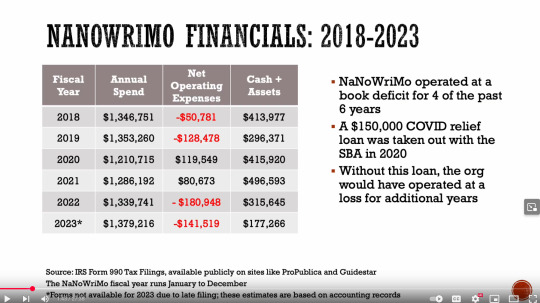
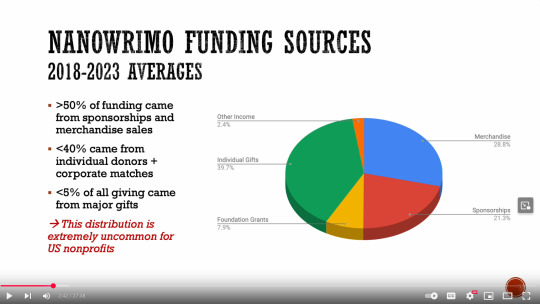
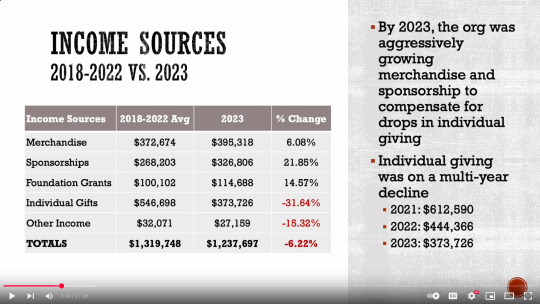
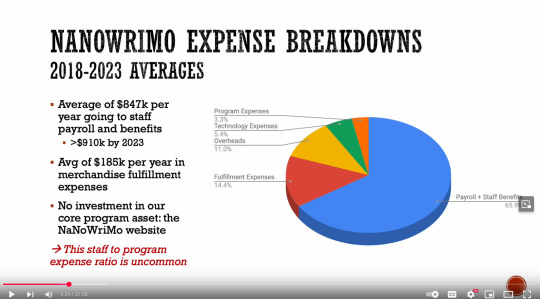
I did not create this summary but I have permission to share it.
Act I, the background:
The video opens with a timeline of Nano's history, Kilby glazing herself, and bragging about participation numbers.
When Kilby joined the board, she "figured we must be getting five- and six-figure support from big publishers" and "big authors." But, SURPRISE! "Nanowrimo never had that level of backing."
Shows some charts (screenshots, below). Note that the charts show that right around half (give or take, depending on the year) of Nano's funding came from charitable contributions.
Immediately after showing these charts, she says the organization was "primarily funded by sponsorships and merchandies, and not by charitable contributions." This is a great sign for what's to come. *As of 2020, Nano was "six-figure[s]" in debt. Her time on the board was focused on fundraising.
Act II, the scandal:
Kilby claims that the grooming of children ONLY happened off-site, NEVER on nano itself.
Kilby claims that the board publicly shared the findings of its investigation into CF after 10 days. It is implied this was done back in MAY.
Kilby admits nobody had any relevant training or certification for dealing with children.
Kilby claims nobody at NaNo knew who CF/Mod X really was (blatant lie) because they just didn't keep those records, which prevented them from being able to work with child protection organizations.
Kilby claims she was tapped for the ED position because she "understood youth-facing organizations" and "had experience with the required state-mandated training." No evidence of this understanding or experience is supplied.
More self-glazing
"Our top priority is, and was, child safety." lol
Kilby claims they implemented staff background checks "immediately" (later in the video, she'll claim that some unspecified number of people had been "vetted" and were working with the org again).
Further claims that they "developed an advice content [sic]" aimed at teaching minors how to be safe online. ….where? who knows?
Claims they started verifying educators on YWP.
Act III, the community:
Forums: Inconsistent moderations, outdated TOS. Saw problematic, unaddressable behavior. Couldn't maintain the integrity of the space.
One of the problems was that they had "encouraged" "volunteers" to set up "unofficial" Discords and facebook groups with the Nano name. "Nobody under nanowrimo's authority was moderating those groups." Using resources to deal with issues from these "unaffiliated" groups.
"The number of people who view themselves as experts by virtue of how long they've been doing Nanowrimo… numbered in the tens of thousands." [The salt really starts here]
Act IV, the fallout:
ED job was "bigger than rebuilding after an educational crisis" [because you're so good at that, clearly]
When Kilby took over, there were more than a dozen existing labor violations.
Participation had been declining since before 2020, fell off a cliff.
Sponsor money in March 2023: $310k. Sponsor money in March 2024: $125k
2023's funding shortfall was equal to 20% of their total annual budget
"We were operating outside of our mission." Claims they became an "advocacy group that actively lobbied for authors." No further specifics of how, for who, or to whom are provided.
We COULD recover from this, except for not having money.
Act V: Conclusion (why is there still 10 minutes left in the video??)
Nano is shutting down.
Website will stay up "as long as possible, but we cannot guarantee a specific end date" [because I don't know what the host's non-payment policies are or when the check will bounce]
We were going to merge with another writing org, but they noped out when they saw our debt.
"Other potential supporters" were scared off by mean, dastardly 'ol REDDIT
"Many people who withheld their support, or supported us anonymously, told us that the tone of the community was a big issue."
The press was mean to us and inaccurate about our position on AI. (what press? Youtubers??)
Kilby claims they TURNED DOWN "a number of" AI sponsors because it "went against our mission."
"The real alternative to the organization closing, and I can't say this enough, would have been for us to been funded [sic] by the community." No kidding?
"Community funding shouldn't have been a problem."
The collapse of Nano was because of things that happened before I got here (financial mismanagement), but it absolutely wasn't because of AI or a scandal. Don't put it in the newspaper that it was because of AI or a scandal. Those were just a coincidence.
Thank you to everyone I fired, drove away, etc. etc.
283 notes
·
View notes
Text
What is Dataflow?
This post is inspired by another post about the Crowd Strike IT disaster and a bunch of people being interested in what I mean by Dataflow. Dataflow is my absolute jam and I'm happy to answer as many questions as you like on it. I even put referential pictures in like I'm writing an article, what fun!
I'll probably split this into multiple parts because it'll be a huge post otherwise but here we go!
A Brief History

Our world is dependent on the flow of data. It exists in almost every aspect of our lives and has done so arguably for hundreds if not thousands of years.
At the end of the day, the flow of data is the flow of knowledge and information. Normally most of us refer to data in the context of computing technology (our phones, PCs, tablets etc) but, if we want to get historical about it, the invention of writing and the invention of the Printing Press were great leaps forward in how we increased the flow of information.
Modern Day IT exists for one reason - To support the flow of data.
Whether it's buying something at a shop, sitting staring at an excel sheet at work, or watching Netflix - All of the technology you interact with is to support the flow of data.
Understanding and managing the flow of data is as important to getting us to where we are right now as when we first learned to control and manage water to provide irrigation for early farming and settlement.
Engineering Rigor
When the majority of us turn on the tap to have a drink or take a shower, we expect water to come out. We trust that the water is clean, and we trust that our homes can receive a steady supply of water.
Most of us trust our central heating (insert boiler joke here) and the plugs/sockets in our homes to provide gas and electricity. The reason we trust all of these flows is because there's been rigorous engineering standards built up over decades and centuries.

For example, Scottish Water will understand every component part that makes up their water pipelines. Those pipes, valves, fitting etc will comply with a national, or in some cases international, standard. These companies have diagrams that clearly map all of this out, mostly because they have to legally but also because it also vital for disaster recovery and other compliance issues.
Modern IT
And this is where modern day IT has problems. I'm not saying that modern day tech is a pile of shit. We all have great phones, our PCs can play good games, but it's one thing to craft well-designed products and another thing entirely to think about they all work together.
Because that is what's happened over the past few decades of IT. Organisations have piled on the latest plug-and-play technology (Software or Hardware) and they've built up complex legacy systems that no one really knows how they all work together. They've lost track of how data flows across their organisation which makes the work of cybersecurity, disaster recovery, compliance and general business transformation teams a nightmare.

Some of these systems are entirely dependent on other systems to operate. But that dependency isn't documented. The vast majority of digital transformation projects fail because they get halfway through and realise they hadn't factored in a system that they thought was nothing but was vital to the organisation running.
And this isn't just for-profit organisations, this is the health services, this is national infrastructure, it's everyone.
There's not yet a single standard that says "This is how organisations should control, manage and govern their flows of data."
Why is that relevant to the companies that were affected by Crowd Strike? Would it have stopped it?
Maybe, maybe not. But considering the global impact, it doesn't look like many organisations were prepared for the possibility of a huge chunk of their IT infrastructure going down.
Understanding dataflows help with the preparation for events like this, so organisations can move to mitigate them, and also the recovery side when they do happen. Organisations need to understand which systems are a priority to get back operational and which can be left.
The problem I'm seeing from a lot of organisations at the moment is that they don't know which systems to recover first, and are losing money and reputation while they fight to get things back online. A lot of them are just winging it.
Conclusion of Part 1
Next time I can totally go into diagramming if any of you are interested in that.
How can any organisation actually map their dataflow and what things need to be considered to do so. It'll come across like common sense, but that's why an actual standard is so desperately needed!
789 notes
·
View notes
Note
what do you think is the answer to dealing with the stereotypical “roommate won’t do dishes bc of trauma/sensory issues”? like sure that’s possible it’s difficult & people should be aware of their needs, but when it begins affecting other people, i feel like someone has to consider other solutions—i.e. using paper plates instead of ones they have to wash. it’s also complicated when racial & gender dynamics come in to play. and then when i think on myself as an autistic white trans guy how can i both recognize where i need support but balance it with not recreating bad dynamics? I’m just not sure how we have these conversations while still validating folks experiences & dismissing their problems. we all deserve help but we also can so easily overly rely on others & burn them out especially if we have privilege over them. disability, especially invisible disabilities often become a shield for white folks & men it feels like to get away with shitty behaviors
I honestly think that a big problem people encounter in navigating such issues is that they make what is ultimately going to have to be a personal negotiation of limits and needs into something that is far more symbolic and abstract. it's almost impossible not to, if you care about social justice issues, and I think there are good intentions when people try to be mindful of how race and gender alongside interplay with this stuff, but in practice a lot of times people use their political ideals as a reason to argue against their own feelings or to not be honest about their feelings. people feel like they don't have the right to say that they cannot do something or need support, or that they're pissed off, in an individual level relationship, because they are treating both themselves and their roommate or partner as a symbol of an entire group. I think a person has to be able to tell their roommate when they are being an asshole. I think a person should just be straight up if doing the dishes is something that's not generally going to happen for them -- in unmasking autism I profile Reese Piper, an autistic sex worker who just straight up tells her prospective roommates that doing the dishes is not something she can do, so then they know what they are getting into and can work around it. honest conversations about what a person is and is not capable of and what they need really can vanquish a lot of so-called weaponized incompetence and other domestic issues long before they occur. but all parties involved have to be operating based on good faith. unfortunately not everyone is, sometimes people use their identities or their roommates guilt around structural oppression in order to pressure them to do things that they cannot do, and conversely it is very common for a white or TME roommate to weaponize anti blackness or transmisogyny against a roommate who speaks up about any inequity and portray them as the aggressive one. but I think before somebody gets way way too much in their own head about how a particular conflict looks or what structural issues might be relevant in the aggregate, they really have to start from a baseline level of self-acceptance and the ability to articulate both which household tasks are hard or impossible for them, and when they are fucking cheesed at their roommate for not doing what seems like their fair share. if you feel like you can't name those things, you're never going to actually have a respectful functioning relationship.
209 notes
·
View notes
Note
Do you ever have a passive gripe with the way trade is represented in medieval/sci-fi/post-apocalyptic fiction? I can't shake the feeling that those are societies that have moved beyond the need for abstract currency - that such forms of trade are more a concession for the viewer to analogize trade to our world instead of offering some kind of unique barter for a world.
A medieval peasant isn't gonna want gold coins for jack because the next trade caravan is two seasons away, they'd much rather a useful tool or some extra fertilizer. Credits in science fiction universes can become worthless due to Future™️ hackers setting their bank accounts to extraordinarily high values, so extra parts for firearms and spaceships are much more useful. Caps in Fallout just make no sense in a world where food and water are few and far between!
I feel unreasonably grumpy about this and I wanted to know if you have any kind of insight to this kind of thing.
There are a couple of only partly related problems here:
1. The idea that the economies of most sci-fi and fantasy settings, as depicted, don't make any sense. This is absolutely true, because most science fiction and fantasy authors don't really think about that sort of thing – their settings only have economies to the extent that the details of those economies are relevant to the plot, which they usually aren't.
2. The idea that it doesn't make sense for currency to exist in these settings because most of them logically ought to have barter economies. The trouble with this assertion is that there's no such thing as a barter economy. Yes, you can describe what one would look like, but no civilisation which has ever actually existed has operated in this fashion. It's a made-up idea – at best, a spherical-cow approximation of how the exchange of goods and services operates in a stateless society, and at worst, complete bullshit.
Consequently, whether or not it makes sense for anything like currency to exist is going to depend on the particulars of how the setting's economy operates (i.e., all the details that that are getting glossed over in point 1, above). About the most we can say in nearly all cases is that we simply don't have enough information about a given fantasy or sci-fi setting's economic structure to know whether it makes sense to have currency or not; we can't just assume in the absence of further details that things will default to a barter economy, because – again – there's no such animal.
#media#tropes#fantasy#science fiction#sci-fi#gaming#video games#tabletop roleplaying#tabletop rpgs#worldbuilding#game design#economics#politics#swearing
2K notes
·
View notes
Text
Project Esther
Okay, Jumblr, we all know about Project 2025, the roadmap the Heritage Foundation wrote for destroying the United States that Operative Krasnov and Mr. Apartheid are using to dismantle the United States.
Well, the Heritage Foundation has another roadmap, Project Esther. Their plan to "help us" by "combatting antisemitism". It even successfully identifies the nightmares going on on college campus "protests" as a problem that needs addressing. Unfortunately, that one sentence elevator pitch is the only sanity it has.
I know we don't trust Wikipedia, and for good reasons, but it's still unfortunately the best resource for summaries on things like this, and to quote the relevant article,
"The effort has received the support of a number of evangelical Christian but no major Jewish organizations. It has been criticized by journalist Steve Rabey for incorporating antisemitic tropes into its rhetoric, and by Slate and Haaretz for not addressing right-wing antisemitism.[1][2][3]"
and
"The project reportedly struggled to find Jewish organizations with which to partner, while sidelining those that do partner with it.[8][9]
The group has targeted eight "masterminds"—George Soros, Alex Soros, JB Pritzker, Angela Davis, Manolo de los Santos, Vijay Prashad, Neville Singham, and Jodie Evans—who it believes are at the center of progressive politics. The Soros family is the subject of a number of longstanding antisemitic conspiracy theories that match the language used by Project Esther.[10]"
To that I would add that not only are the Soros family a popular target of antisemitic conspiracy theory, but JB Pritzker is a popular and prominent Jewish governor who occasionally gets 2028 presidential speculation - and this is a sign that he will get the same antisemitic conspiracy theory as he becomes more prominent outside of Illinois.
So, its pretty easy to see where this is going. They're going to try to perpetuate antisemitism to take out prominent and/or powerful Jews, using opposition to a common enemy (actual antisemites) as a trojan horse to get us on-side.
Two important notes for this, one for each of the major Jewish populations.
1.
My fellow American Jews, we need to be very, very, very careful about this sort of divide and conquer, and choose our allies wisely.
We cannot afford to ally with the pro-Hamas nuts who want to kill American Jews but oppose the fascists, but we absolutely cannot afford to ally with the fascists who have established intent to try to use our fear of the pro-Hamas nuts to get us to subjugate ourselves and destroy of our own voices speaking out for us in favor of the "Jews should all go to Israel to be good little human sacrifices for our summon Jesus ritual" philosemites.
It's already begun in some ways - Operative Krasnov has broken the long-standing tradition of naming a Jewish-American to be Ambassador to Israel, naming a prominent Evangelical instead.
Keep an eye out for what shape their "cracking down on Antisemitism" takes - it may start with punishing openly pro-Hamas folks, but will move on to punishing Jews who don't fit their philosemitic caricature soon enough and if we get caught unprepared, we may not make it. We cannot afford to be surprised, and we cannot afford to either try to make it out of this alone or make allies purely on an enemy-of-my-enemy basis. We need to be prepared, we need to make friends, and we need to be as careful as humanly possible
2.
Israeli Jews, I'm begging you. Watch out for this, we WILL need your help with this. Your current insane government is allying itself to the fascists running America. This is convenient for you geopolitically in the short term, but please, for the love of Hashem, do not let them trick you about us.
The time will come, and its not too far off, when the current American regime tries to move forward with Project Esther and start declaring prominent American Jews who dare not toe the Evangelical Christian definition of what Judaism is line of being "antisemitic" and persecute us to as much of an extent as they can force the law to accommodate, and for the sake of geopolitics I fear that your government is going to back them up instead of fulfilling its promise to be a safe place to flee to and a voice of advocacy and protection for Diaspora Judaism.
We, the Jews of America, are counting on you, the Jews of Israel, to be our voice in Israeli Politics. When America starts implementing Project Esther declaring publicly that prominent Jews are the "real source of antisemitism" and trying to "protect the Real Jews" by persecuting actual real Jews. When your government responds by telling you your kin across the ocean are enemies and to be happy open nazis are oppressing us. When, soon, that day comes, we are depending on you to protest and advocate for us to the Israeli government to make sure it speaks out in our defense as our ancestral home and heart, rather than speaking out against us as a geopolitical ally of our persecutor. If for no other reason, then to make it legal for us to flee to Israel when all other options have been denied to us, to prevent the Israeli government from telling us to get fucked because by voting for Democrats in American Elections we were deemed "antisemites" unworthy of making Aliyah or whatever
This all sounds like conspiracy mongering. So did Project 2025. The Heritage Foundation is very real, very powerful, and very prominent - we cannot afford to take anything they say less than deadly seriously, and so we cannot afford to ignore Project Esther.
Am Yisrael Chai, and Am Yisrael Michpacha.
#Jumblr#Judaism#United we stand and divided we fall#project esther#American Jews#Israeli Jews#Israel#antisemitism#heritage foundation#am yisrael chai#stay safe my fellow jews
242 notes
·
View notes
Text
So, I've noticed a lot of people have talked about how the Trump executive orders mainly affect trans women, due to language used, and how trans men don't have much to worry about.
This, is incorrect, but I've still read the arguments from those who support this position, and I've noticed one thing in common - ignorance of statutory interpretation.
So, I'm here to put my education in law to use, and finally put to rest why these executive orders do and will affect trans men/mascs, once and for all.
Firstly, a primer:
So, there are three main approaches to statutory interpretation, that are relevant. Others such as textualism are mainly applied in Constitutional Law, and I'd argue aren't relevant to this discussion, so I'll skip over it. The approaches, and explanations/examples are as follows:
The golden rule
The literal rule
The mischief rule
Golden Rule: this one is pretty simple. It's the rule that one should interpret the law in a way that will avoid absurd results not intended by the legislature.
An example of this would be a law that says that no vehicles are allowed in a park. "Vehicle" can be defined as such: a conveyance moving on wheels, runners, tracks, or the like, as a cart, sled, automobile, or tractor.
A stroller used to transport children could be applicable to this definition. Do you think the legislature intended for a public park to prohibit parents from walking around with strollers? Interpreting it literally would lead to this, and thus we should apply this rule to avoid such an absurd result
Literal Rule: This one is pretty simple. As the name suggests, this is where the courts simply look at the words of the statute and apply them as they are written giving them their ordinary and natural meaning.
Easy example would be laws on how many dogs one can own in a household. Dog is defined as a carnivorous mammal (Canis familiaris). So, someone who has 10 canines, when the law says four maximum would be breaking the law, and you wouldn't interpret to to say four canines, three cats, and four ferrets would be breaking the law.
Mischief Rule: The mischief rule tells an interpreter to read a statute in light of the “mischief” or “evil”—the problem that prompted the statute. So, you look at what the law originally intended to protect and correct, say, 90 years ago, and interpret the law to reflect this in the modern era. An example of this would be arresting someone for "operating a vehicle while intoxicated", while riding a bicycle down a busy road. Sure, the lawmakers intended for it to be cars and trucks, but if we interpret it the way that they intended, you'll then allow people to ride bikes drunk, and that's a hazard to the person riding said bike as they could seriously harm themselves.
So, with these definitions clearly defined, let's put this into practice, with real world examples:
Keeping Men out of Women's Sports

Pop Quiz: which of the three rules would a Conservative judge utilize? Go on, give it a shot, go back and read over the definitions again if needed- ready?
The answer is: Mischief
This EO was written for the purpose of preventing individuals of the opposite sex from competing with each other. Sure, it talks about how it's to focus on "women's categories", but the intent was to focus on maintaining single-sex spaces, which a trans man in men's sports would go against.
Defending Women from Gender Ideology Extremism and Restoring Biological Truth to the Federal Government

Ready for another exercise? Which rule would be used here by a Conservative judge?
Ready?
Literal Rule.
This one is pretty simple. It says that spaces for females is only for those with a vagina, and those for males are for those with a penis, as that's the most plain definition of male and female as per the dictionary. Albeit reductive and ignores intersex people, it's still the literal meaning.
Protecting Children from Chemical and Surgical Mutilation


Which rule would be applicable here? Here's a hint:

Ready?
Mischief Rule
The reason being, is that these two sections had the goal of preventing any sort of gender affirming care for minors (those under 19 as per this EO), whether it be surgery or medication. So, a judge would interpret "FGM" in light of this, to prevent the absurd result of allowing treatment for trans men (as they're men and not females, and you can be sure that the judge will respect a trans man's identity in order to enforce this).
So, as you can see from these three real world examples that are often brought up in conversation about how these orders "only affect trans women", it's entirely possible to apply these laws to trans men and transmasculine individuals, through legitimate practices used every day in the legal system. Not every judge uses the plain meaning rule, this is a verifiable fact.
I hope this post was of some use, and has been enlightening to those who weren't aware that this is even a thing, and hopefully we can stop arguing over who has it worse with these EOs, because, as you can see, it doesn't matter how it's written, or what "gotchas" you try to find - because the President wants to destroy trans lives, he can easily do this, no matter how the laws are written, so long as he has the right judges.
156 notes
·
View notes
Text
caitlyn kiramman x spy!reader pt. 1



pairing! sheriff!caitlyn x spy!reader
about! you get a new assignment to shadow under the sheriff: caitlyn kiramman. but you know something that she doesn’t…
cw! nothing!
word count! 392
an! i know im getting out of the habit of writing multiple parts to stories, but y’all i swearrrr this one is going to scrumptious when i finish.

you weren’t an enforcer.
far from it.
you misspoke when you said the oath. your badge was never worn with pride. the uniform?—sure, you guess. the smile? perfect? your act? flawless. it had to be flawless—which wasn’t a problem for you. because it was fabricated, your whole façade. you weren’t some wide eyed, brand new trainee who got the golden opportunity to train under the sheriff: caitlyn kiramman.
quite the opposite. in fact, you only answered to councilor sevika. her spy. her shadow. her most trusted operative.
and now? you were sent to infiltrate the enforcers, just to make sure there was no corruption or under the table deals. sevika had seen her fair share of hypocrisy working under silco, and she wasn’t going to allow it to happen again. of course, that’s where you come in! any information you pick up that was even slightly relevant, you relayed it to sevika.
you arrived at the station promptly at 9:30 AM, your boots polished without a scuff, uniform perfectly ironed, and a small notepad clutched tightly. just for the effect. walking in, you approached the front desk, with a comatose looking officer behind it, scribbling random notes. “pepping” yourself up, you walked over to the desk, tapping the tiny bell with manufactured enthusiasm.
“hello! do you know where i can find sheriff kiramman? im her new trainee!“ you beamed, earning an annoyed glance from the officer.
he grunted, jerking his head towards a pair of doors to the right. you thanked him and nearly skipped towards the doors. entering into a large, open area, you assumed that this was the main floor of the station. rows of desks lined the floor, file cabinets filled to the brim with case files, just as dull as you imagined.
your boots clicked on the tiled floor of the station, weaving between desks and officers going about their morning routines. a manufactured grin—chipper and not overly excited, just eager. that’s when you heard kiramman. you didn’t even really have to look, you were nearly certain of it. just the veil of now muted conversation, the sound of heels clicking rhythmically. before you knew it, you were basically face to face with caitlyn kiramman.
“miss…?” she asked, caitlyn’s british accent prominent and a bit authoritative.
“im a new transfer, ma’am! i believe im under your supervision?”
#dear mimi#mimi’s thoughts💕#wlw#sapphic#wlw yearning#lesbian#wlw blog#wlw post#sapphic sfw#wlw concepts#wlw fluff#wlw community#wlw love#wlw sfw#lesbian sfw#arcane#caitlyn arcane#arcane caitlyn#caitlyn x you#caitlyn kiramman#caitlyn x reader#caitlyn i love you#league of legends caitlyn#caitlyn x y/n#sheriff caitlyn kiramman#cait kiramman#commander kiramman
101 notes
·
View notes
Text
Why I hate Reed
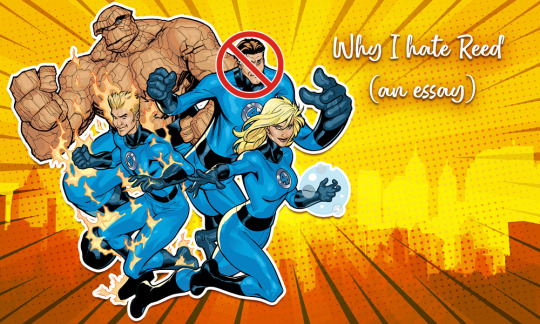
Fantastic Four has a long history of disaster after disaster. Most of the disasters in question were caused by Reed. Bet you didn’t expect me to jump right into it.
Okay, fine, let’s do an introduction first.
Fantastic Four has been a Reed-centric story since the day he broke ground on Marvel-1 (known at the time as just a rocket) and took his bff, girlfriend, and her tag-along brother on a ride, to the day his arch-enemy took over the world (that was last week). It’s all about Reed and everyone else just happened to get stuck with him.
I hate Reed. Maybe not as much as Doom does, but it’s close.
I have my reasons.
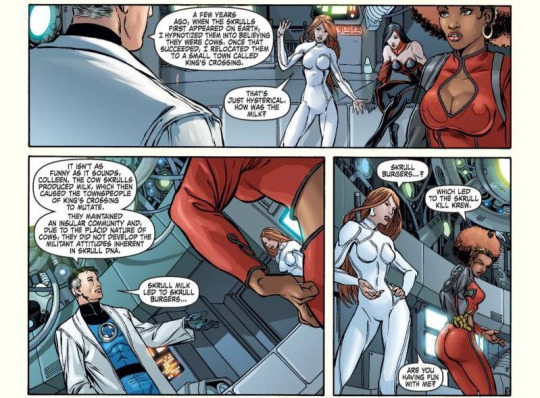
If you know Reed well, chances are, you also hate him. If you don’t know him, you’re lucky. If you don’t hate him… keep reading.
Reed has always been always the intended protagonist of the Fantastic Four. They might have called it a family book but really, you tuned in every month to find out who is bugging Reed and whether he manages to fix everything this time. That’s who he is, he fixes everything. Mostly through the power of science, occasionally by stretching in the most ridiculous way.
Reed is recognized by CB writers as a hero, not just a hero in a cape and mask sense (he doesn’t even wear those) but the cool-headed, smart guy, the focal point of the team and the narrative. You are supposed to see yourself in him and imitate his approach.
Everybody cares about him, everybody talks about him, and in those rare moments when he’s presumed dead, everybody mourns him.
But Reed just isn’t a good person. There are things about him that don’t just fail to align with heroism, they’re plain vile.
He’s a liar
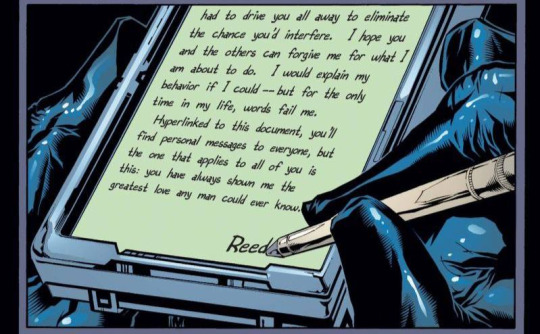
Reed is a liar. It’s not just that he omits relevant details like, say, forgetting to inform the whole team that they are slowly dying, or warning them that he’s keeping a dangerous gate in the basement. This is absolutely a pattern with Reed and instead of getting mad at him, people just accept it as a part of his character. Even if they do get pissed off, they eventually forgive him. Then all of that repeats. To be fair, I probably should be more mad at the dysfunctional family that enables his behavior.
But it’s still him. The logical path he loves so much to take inevitably leads him to the conclusion that it’s time for yet another lie. He’s not above covering one lie with another, and it comes off almost childish (not in the adorable sense). What I mean is, he is afraid of being judged because he knows what he’s doing is wrong but he simultaneously believes that he is right because he knows better. Again, this comes down to him claiming to be the smartest man on Earth. Which is ridiculous. The smartest man in physics is still the stupidest when it comes to art or magic. And he admits both things himself yet refuses to accept the fact that he knows almost nothing.
Besides, both his daughter and Lunella are easily smarter than he is.
He’s a hypocrite
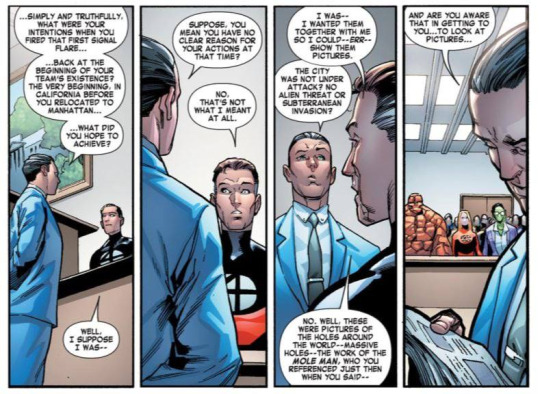
Reed is a terrible hypocrite. We don’t talk about that often, because the stories that allow you to notice that lie far apart. During the Civil War, he was all happy to serve the government. It is a big part of his life, he’s always been ‘public’ and ‘legitimate’. In the eyes of the law anyway. So when the question of whether or not to register appeared, he made a call for everyone. Happily so, and he went along with punishing everyone who opposed it. Except for his family, of course. It smells awfully similar to the way dictators operate so I guess we should be thankful Reed doesn’t have those ambitions.
But when the tables turn and Reed has to answer for all he’s done, he believes that he is judged harshly. Of course, it turns out to be a villain’s plot but he never really stops to think how his actions were questionable at best. And he isn’t prepared to take responsibility the same way he expected others to. He thinks it’s unfair.
He’s a garbage person
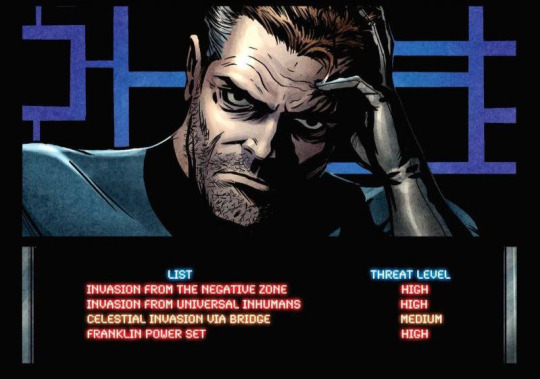
Essentially, the problem is Reed not knowing when to stop. Reed is stubborn, we already know that. He is convinced that he knows what is best for everyone. He believes that his view of the world and how things should be is the correct one. The mathematically correct one, I mean, he did write all those equations on all those walls. This is what eventually led to the Civil War, and this is what eventually led to the Secret Wars. The two most notable events on 616. Reed’s math allegedly allowed him to predict the future, and in that future, he saw Doom. JK but he did see that superheroes will destroy the world if they keep on unchecked. And he did see the possibility of incursions. So he built 42 and threw his friends there. He experimented on Speedball to the point of torture because the government said it was ok. He got together with the Illuminati pre-Secret Wars convinced that they could definitely stop the incursions and they failed. They would’ve gotten everyone killed and, big shocker, the only ones he ended up saving were himself and his family (although Justice finally said “Hell no!’ and his family perished.)
But Reed sure knew what was right.
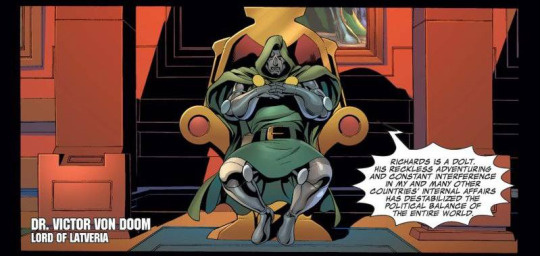
With that same attitude of knowing what’s best, he stomps around Latveria, trying to liberate it. He returns there every time and every time acts surprised when he discovers that Latverian people don’t want his liberty. They don’t want him, they like Doom.
I feel like deep down Reed believes that his unique intellect allows him to see things more clearly than any of us mortals. And because of that, everyone should sleep well, putting their trust in him. Whether he invents another doomsday device (and promises not to use it), keeps Ultimate Nullifier in his nightstand, or stores a gate to anywhere in his basement. Everyone is supposed to trust him until turns out that his 3-year-old accidentally opened it. That’s happened a few times and if anything, we should know by now that Reed is anything but trustworthy.
He never stops to think “Should I?” Because the answer is pretty much always “No.”
He’s an awful husband
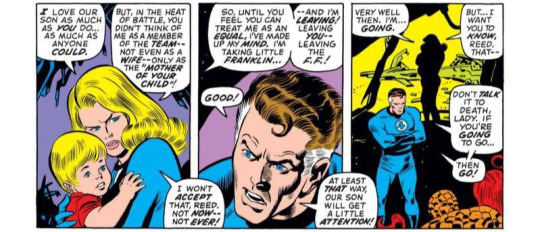
Back in the day, Sue often ended up on the other side of Reed’s outbursts. His smug attitude toward her was always uncomfortable, to say the least. He diminished her and everything she did because he deemed it irrelevant. It barely changed until the writers elevated her almost to his level by making her a doctor of Archaeology. While I appreciate them giving her some interests other than making sandwiches for everyone who resides in the BB, does it mean that they agree with Reed? That everything she did, whether she wanted to be an actress, ran their company, charities, or simply stayed at home with the kids, is not good enough? It makes sense in terms of their shared interests, but the only thing it gives me is doubts about him even loving Sue. Unfortunately, it seems like he sees her as a trophy wife he never could’ve gotten. When he talks about Sue, he often says that he studied her, like she’s an object that fascinates him. This kind of explains why he can’t relate to her, refuses to trust her, and doesn’t always care how his actions would affect her.
When Sue was Malice, everything she told him was pretty genuine. There is a trope where heroes say the worst things under the influence, yet these things are rooted in reality. And that’s what happened here.
There was another piece of truth Reed got when Johnny had a fight with Sue (about keeping from him the fact that the whole team’s powers were deteriorating, and their bodies too), he told her “You’re treating me like he treats you!” Reed didn’t react and that was never addressed again. Too bad, we all know that’s true. Reed has no respect for Sue. Even Reed knows that, I just don’t think he gets it.
Let’s not forget that Sue served him divorce papers. What a time that was.
He’s a terrible father

He starts out as an oblivious parent who doesn’t really care. As long as the kid can’t speak it’s not his problem, right? Hence multiple babysitters and Franklin spending half of his childhood with Agatha, in Attilan, and at Alicia’s place. Franklin is a creator, not a scientific one either and that’s something Reed can’t understand. That’s why he’s been having a hard time even connecting to his son. Okay, he might not be the easiest kid to connect to but with the constant neglect he’s experienced, no wonder he feels like a disappointment to everyone.
Val has a good father, Doom. He’s actually more of a parent to her than Reed, even if she’s the child Reed actually likes. Unless that’s just him being possessive. Just like with Sue (whenever she had her Namor eras) Reed is jealous of Val’s bond with Doom and as soon as he feels like he’s losing her, he gets mildly irritated. That’s exactly it, he’s not even properly furious – he just gets upset and focuses on work.
Even all the family adventures they went on, or that time after Secret Wars when Reed decided that Ben and Johnny should believe their family is dead (including the kids), couldn’t make up for that. After all, Reed probably spent more time in his mobile lab than with kids. And when he got bored he happily ditched everyone except Frank and Val. So much for calling them all “their kids”. They are better off anyway because Reed doesn’t consider their feelings. At least he treats them like adults, since he doesn’t consider them either.
He’s unkind and a trash friend

There is no genuine kindness in Reed. It’s almost like he pretends to be a loving husband, parent, and friend.
Reed has no respect for his family or friends. If he had, he would’ve considered them whenever he made a decision. Again, it comes back to him believing he can’t make a mistake (check how long he’d been agonizing over the first space mission). Yet the vast majority of Reed’s actions vary from mean to straight-up creepy.
Even the seemingly selfless gesture of turning his team into celebrities was his pathetic plea out of guilt. He never asked any of them whether they even wanted to be famous or heroes. He felt guilty (that’s something, I guess) for turning Ben into The Thing, and complicating things for Sue and Johnny (although, they probably would’ve been fine).
But that’s a pattern that follows Reed everywhere and everybody ends up getting hurt.
Despite claiming to love his wife and kids, care about his friend, and tolerate Johnny, he is unkind to them. He views and moves them as pawns to where he wants them to be, all the while faking the perfect family man and good friend facade. And that’s the new Reed, the old one barely pretended.
Let’s face it, Reed and Ben don’t have much in common except the collective trauma of getting powers and fighting Doom. The funny part is, Reed wants to be friends with Doom but Doom sees through his BS (okay, I might be giving props to the dictator here but ain’t he right?)
He’s way too full of himself
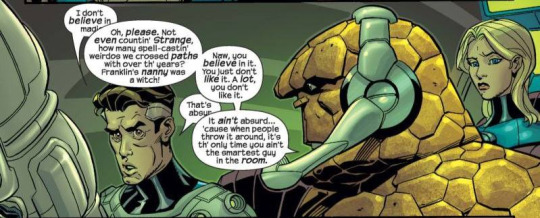
The self-proclaimed smartest man on Earth, Reed lives in the world of science. He is obsessed with math and he believes that math will solve everything. Spoiler: it won’t. He knows that, too. When Doom kidnaps his family and locks baby Franklin in Hell, Reed wastes so much time arguing with Strange over his aptitude for magic, that the kid ends up traumatized. For a while Franklin couldn’t tell the difference between Hell and Reality, all because his father couldn’t accept that he doesn’t know everything.
This is absolutely a pattern with Reed — he doesn’t believe in ghosts, vampires, probably even werewolves. Meanwhile, he knows actual gods and had a witch for a nanny. If anything, this is a sign of stubbornness and that’s one of the worst barriers for wisdom. So good at math he might be, a genius — I don’t think so. That’s not all there is to it, because there are absolutely people smarter than Reed with a more flexible mind. I have to give points to him for recognizing that eventually and forming Future Foundation but he still has ways to go. So far, math has been a source of trouble more often than not. His inventions and his equations that predict the end of everything force him to take the most ridiculous approach in trying to solve problems before they arrive. And if that’s how we see Reed, imagine how irritating it is to Doom.
And while we’re at it, they might have changed the origin so that Reed’s original calculations weren’t incorrect but that was wrong. The poetic justice of math, the only thing he truly trusted, betraying him, that was beautiful. If only Reed could understand art.
He’s dull
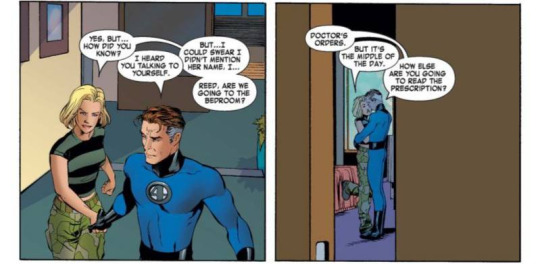
Let’s face it, they can rewrite Reed’s history, they can try to make him fun, they can even hire a really good actor to play him, but Reed is incredibly dull. He’s boring and even his family doesn’t pretend he isn’t. He is not charming, has zero charisma, not funny, and really he’s extremely lucky he managed to get Sue to marry him (because with his other bad qualities and lack of charm idk what that was, unfortunate chemistry?) He’s even more lucky Ben was out of other options friend-wise, and Johnny was just around. Otherwise, Reed would’ve died alone which is frankly, what he very much deserves.
That’s not even half of his misdeeds, just the ones that were on the top of my mind. But trust me, if you spend almost a year reading about this guy, you will likely hate him just as much.
#marvel#marvel comics#comics#comic books#marvel universe#long reads#fantastic four#reed richards#susan storm#johnny storm#ben grimm#valeria richards#franklin richards#victor von doom
129 notes
·
View notes
Note
Ok, so Bren’n’Blaw have been riding shotgun with me at work this morning and I’ve got questions.
What did they think when Bill married Helena? Did they like her? Do they think she’s good for him? Bad for him? TOO good for him?
Not that she would ever need help making or disposing of a body, but I assume they would help her, if only for her family’s sake. But does Helena like them?? Does she know about the mutual murder pact between the B’s?
Also, I assume they’re versatile fixers. In the normal course of things I wouldn’t think a dead body would turn up more than once every other year or so. In the offseason, do they help fudge financing at tax time? Do they hunt down deadbeat dads and encourage child support? Are they the scary but competent but no you were right the first time actually unnervingly scary people at the horse auctions you never try to scam?
Oh dear, I’m so sorry, what a pair of shifty hitchhikers!
When Bill was courting Helena, she set him some quests. Sure, he made her feel safe, and she fancied him in a weird way that grew on her, and it all represented a massive two fingers up to her parents; but she was still lowering herself to marry him, and figured she might as well get some errands done. Helena does not mind about the crime. She thought this was a relevant perk.
Bren’n’Blaw helped with the quests. They have very little sense of what is normal, and at the time, were painfully loyal to Bill. They knew Bill wanted to marry and raise a brood of champions, so they buckled up and trotted off to slay Helena’s dragons for her. That’s probably what women like. Who knows. Despite their fascinating personal lives they are not romantic themselves.
They did not like Helena being English. They were unfazed by her snobbery. They admitted that she is very pretty. I don’t know if Helena converted to Catholicism or was an outlier for her time and place and class who already was, but surprisingly, that wasn’t something Bren’n’Blaw actually cared much about.
She, in turn, understood their utility, but disliked everything else.
When the twins arrived, and Helena discovered she didn’t like them, and Bill was working two jobs across two countries before fully retiring from being a jockey, he naturally deputised his henchmen to look after the babies. Blaw and the Saint were simultaneously very good and very bad babysitters (“baby want smoko” / “put baby in pelican mouth” level of bonkers, but physically surprisingly capable of keeping babies alive, and cheerfully interested in doing so) and they pressed the rest of the family into service. Helena kept having kids, and not liking them, and Bren’n’Blaw kept throwing them loosely into the back of the Land Rover and feeding them on horse vitamins, and potty training by letting them run wild with nothing on the bottom. Everyone liked this state of affairs, and Helena got to pick towering magnificent quarrels about the PEASANTS STEALING HER CHILDREN, without having to wipe any snotty noses or pack any lunches. Perfect!
Bren’n’Blaw were furious about the loss of Charlie and spent a lot of time looking for him - never stopping, really. It became a kind of quest in itself, and obviously was always doomed to be fruitless. This schism started sending major cracks through a family that would otherwise be clannish.
In theory, on Albert’s death, Blaw and the Saint inherit the stud operation up the driveway and the old house, with Bill’s stronghold always having been the training yard. I think the stud operation has to close down, though - they’re all fading in influence and cash.
These days they’re getting on in years, and there are a lot of competing tensions - Bill’s spinal injury, the lack of succession planning - and they spend a lot of time on horsey errands. I think they disappear quite a lot of unwanted horses, which are always a problem, and in addition to training racehorses and doing a thousand all-consuming horsey chores, they probably practice a certain amount of weird DIY vet stuff and quasi-farrier work. There are vague disputes around the territories of other racing dynasties that I intend to fictionalise heavily. They do a surprisingly good line in looming, for ex-jockeys, and can do menacing for a discount.
They are not very nice people, mostly because of the lack of moral compass, but they are devoted to Killie.
They sound like a loopy pair of unadoptable bonded rescue cats who are also comedy Arthurian knights. Sorry.
69 notes
·
View notes
Text
Disclaimer that this is a post mostly motivated by frustration at a cultural trend, not at any individual people/posters. Vagueing to avoid it seeming like a callout but I know how Tumblr is so we'll see I guess. Putting it after a read-more because I think it's going to spiral out of control.
Recent discourse around obnoxious Linux shills chiming in on posts about how difficult it can be to pick up computer literacy these days has made me feel old and tired. I get that people just want computers to Work and they don't want to have to put any extra effort into getting it to Do The Thing, that's not unreasonable, I want the same!
(I also want obnoxious Linux shills to not chip in on my posts (unless I am posting because my Linux has exploded and I need help) so I sympathise with that angle too, 'just use Linux' is not the catch-all solution you think it is my friend.)
But I keep seeing this broad sense of learned helplessness around having to learn about what the computer is actually doing without having your hand held by a massive faceless corporation, and I just feel like it isn't a healthy relationship to have with your tech.
The industry is getting worse and worse in their lack of respect to the consumer every quarter. Microsoft is comfortable pivoting their entire business to push AI on every part of their infrastructure and in every service, in part because their customers aren't going anywhere and won't push back in the numbers that might make a difference. Windows 11 has hidden even more functionality behind layers of streamlining and obfuscation and integrated even more spyware and telemetry that won't tell you shit about what it's doing and that you can't turn off without violating the EULA. They're going to keep pursuing this kind of shit in more and more obvious ways because that's all they can do in the quest for endless year on year growth.
Unfortunately, switching to Linux will force you to learn how to use it. That sucks when it's being pushed as an immediate solution to a specific problem you're having! Not going to deny that. FOSS folks need to realise that 'just pivot your entire day to day workflow to a new suite of tools designed by hobby engineers with really specific chips on their shoulders' does not work as a method of evangelism. But if you approach it more like learning to understand and control your tech, I think maybe it could be a bit more palatable? It's more like a set of techniques and strategies than learning a specific workflow. Once you pick up the basic patterns, you can apply them to the novel problems that inevitably crop up. It's still painful, particularly if you're messing around with audio or graphics drivers, but importantly, you are always the one in control. You might not know how to drive, and the engine might be on fire, but you're not locked in a burning Tesla.
Now that I write this it sounds more like a set of coping mechanisms, but to be honest I do not have a healthy relationship with xorg.conf and probably should seek therapy.
It's a bit of a stretch but I almost feel like a bit of friction with tech is necessary to develop a good relationship with it? Growing up on MS-DOS and earlier versions of Windows has given me a healthy suspicion of any time my computer does something without me telling it to, and if I can't then see what it did, something's very off. If I can't get at the setting and properties panel for something, my immediate inclination is to uninstall it and do without.
And like yeah as a final note, I too find it frustrating when Linux decides to shit itself and the latest relevant thread I can find on the matter is from 2006 and every participant has been Raptured since, but at least threads exist. At least they're not Microsoft Community hellscapes where every second response is a sales rep telling them to open a support ticket. At least there's some transparency and openness around how the operating system is made and how it works. At least you have alternatives if one doesn't do the job for you.
This is long and meandering and probably misses the point of the discourse I'm dragging but I felt obligated to make it. Ubuntu Noble Numbat is pretty good and I haven't had any issues with it out of the box (compared to EndeavourOS becoming a hellscape whenever I wanted my computer to make a sound or render a graphic) so I recommend it. Yay FOSS.

219 notes
·
View notes
Text
Star Wars Rant: The Jedi Dogma Lie You Fell For
The older I get and the more of a movie centric perspective I take in star wars (books and comics and games are good, but they either tell stories that aren't relevant or fill in the gaps), the more I've come to believe that the writers lacked the media literacy as much as the fans in regards to how dogmatic the jedi actually were
Palpatine said the order had a narrow and dogmatic view of the force once and the fanbase and writers immediately went "YEAH HE WAS RIGHT" without understanding what was going on and 20 years of telephone later it's become accepted as fact so much that it's permanently poisoned the well.
In the prequel trilogy list of things "explaining" jedi dogma, we have...
The jedi did not want to train Anakin as he was a ball of Trauma. This is fair when your magic system runs on being able to not need let your emotions control you. Anakin needed help, not jedi training.
The jedi not believing Qui Gon when he said there was a sith afoot. The sith have been gone for a thousand years, or so they think. That, enough, is reason to not be sure about it. In the EU/Legends, Dark Jedi cropped up every couple of years so it could have easily been one of those instead. One of them was Qui's former student. AND the jedi didn't just say "that's not a problem, ignore it". They very pointedly say to go investigate the problem. And Qui is good enough at his job that they kept him on the case
The jedi don't allow marriage. It's a monastic order and they are free to leave. There is literally no penalty for just bouncing as long as you don't burn the bridges yourself
In AOTC, we see Obi Wan being especially down on Anakin the whole movie and the other jedi in the scenes, Mace and Yoda, express concern and try to defend Anakin from his own master. Genuinely, Obi Wan is the bigger problem here than any other jedi. He's my favorite, but he's an asshole in AOTC
On Dooku, Mace doesn't think Dooku would do assassination because that is, at that time, super out of how the jedi operate. Dooku was a jedi so it should not have been in his character.
In Revenge of the Sith, Anakin goes to Yoda for advise about Padme but is vague as fuck so he gets vague jedi advise about detaching yourself from the situation and being happy they're going to jedi heaven. He Cannot Give Better Advise because Anakin is being Anakin.
Same movie, Mace says he doesn't trust Anakin with spying on Palpatine because he doesn't think he can handle it. And Anakin is only treated like a shitheal in the film when he acts like one. Yes, there's the undercurrent of him trying to save Padme but the movie doesn't at all explain that he's trying to get into the archives. No one can help him because he's not letting them.
Same movie, Palpatine points out the Dogmatic and Narrow view of the jedi according to the force.
There is really no part of the prequels that doesn't make sense and doesn't exonerate the "dogma" of the jedi in some way unless you're looking at what writers did after the fact.
Do the jedi have issues within the films?
Yes
Are they too beholden to the state?
Probably
But those are different issues and the official writers and the fans have both permanently poisoned the well because they took the big bad of 9 films at face value without criticism
#pro jedi#star wars#prequel trilogy#star wars eu#expanded universe#legends#star wars legends#star wars canon#mace windu#anakin skywalker#obi wan kenobi#star wars the clone wars#yoda#palpatine#darth sidi#darth vader#sith#star wars rant#star wars meta
135 notes
·
View notes
Note
Imagining all the marks getting affected by the “viltrumites are aliens” au… “Sorry bro I can’t hang out this weekend, I’ve gotta milk the eggs out of my 20+ boyfriends” tired are the hands that milk the marks.. imagining them all needing to be helped at the same time.
Proposing a reader that can form like… magic floating hands with his powers so he can help them equally. The semi-transparent sparkly kind of floating hands, not relevant but I see it so clearly… you lose the “reader is just a normal guy” thing, but it’d work out well because they wouldn’t all be fighting over who you help first.
Make reader a farmer of some kind, or like, at least live out there so he can set up a milking Operation. This is me projecting cuz I love country guys, and cowboy boots are a weakness.
I think he'd jokingly call one of the marks a nice bull or smth along those lines and it just makes something start ringing inside their heads cuz woah, yeah, thats good.
Maybe readers got powers similar green lantern, smth along those lines. Would mean reader has to stay focused, but if he's used to using his powers then it isn't that hard.
Maybe readers a retired hero so technically he's a "normal guy", he's just also a former space cop. This would mean he'd probably know about viltrumites and some about their biology too, so, even better milking for the marks.
Now the problem is what to do with all of the eggs, cuz there's gonna be so many of them, and the marks start whining and begging if you do anything outside of putting them inside you or praising them. So, maybe wait till they're more present to take them away.
86 notes
·
View notes